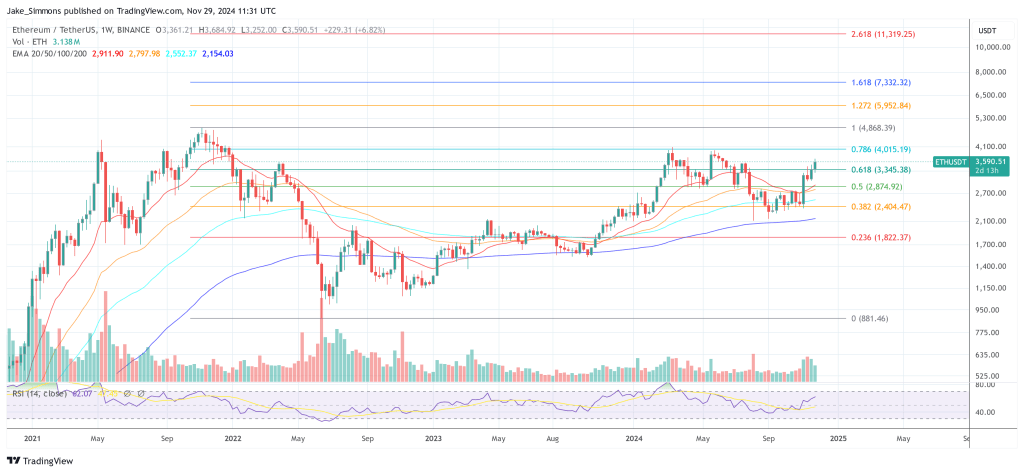The Ethereum Foundation (EF) has announced a substantial financial commitment, investing “tens of millions” of dollars into advancing zero-knowledge Virtual Machines (zkVMs), a cutting-edge technology poised to enhance scalability and security within the Ethereum ecosystem.
Justin Ðrake, a researcher at the Ethereum Foundation, revealed the investment via a post on X: “The EF is investing tens of millions into zkVMs: verified-zkevm.org—zkRISC-V formal verification poseidon-initiative.info—Poseidon cryptanalysis ethproofs.org—L2beat for zkVMs, soon DM me about contributing to zkVM public goods :)”
DM me about contributing to zkVM public goods :)”
Ethereum Foundation Invests Millions In zkEVM Research
The cornerstone of this investment is the zkEVM Formal Verification Project, detailed on verified-zkevm.org. This initiative aims to apply formal verification methods to zkEVMs, ensuring their reliability and security. According to the project overview, the EF seeks to achieve “bug-free zkEVMs” by distributing grants and bounties over an 18-24 month period across multiple stages.
“The project will raise awareness of formal verification methods applied to zkEVMs, document their application, and increase their use,” the project overview states. Additionally, it aims to enhance coordination among different teams within the ecosystem, develop tooling and standards for maintenance and extensibility, and investigate better integration of formal verification methods into software development and maintenance processes.
The project’s scope is confined to RISC-V zkVMs capable of running an EVM compiled to RISC-V, thereby producing a zkEVM. It is structured into three primary tracks:
RISC-V zkVM Track: Focuses on verifying the correct implementation of a RISC-V CPU, arithmetization, and circuits. It emphasizes ensuring that circuits are neither under-constrained nor over-constrained and that computations are accurate. Formal verification of precompiles is also included.
EVM Track: Aims to demonstrate that an EVM running on RISC-V adheres to the EVM specification. Candidates for verification must present performant and compilable EVM implementations on RISC-V zkVMs, such as revm/Reth.
Cryptography Track: Seeks to verify the specifications, security proofs, and implementations of cryptographic primitives and protocols utilized by zkVMs, focusing on FRI and Circle STARKs integrations.
The project emphasizes flexibility in approaches to leverage community expertise and facilitate the comparison of different methodologies. “We will support different approaches where possible to benefit from the varied expertise within the community,” the project outlines, adding that successful methodologies may be prioritized in subsequent stages.
Applications for Stage 1, which focus on establishing maintainable and extensible frameworks, are currently open. Proposals must include detailed overviews, technical approaches, project management plans, and team information.
Another significant component of the EF’s investment is the Poseidon Initiative, as described on poseidon-initiative.info. Poseidon and Poseidon2 are hash functions optimized for verifiable computation protocols, specifically designed to minimize circuit size over prime fields. These hash functions are integral to various Ethereum applications that leverage zero-knowledge proofs.
The initiative aims to enhance the security analysis of Poseidon instances, determining their suitability for high-value applications within Ethereum. Phase 1 of the project runs until December 2025, with Phase 2 slated for mid-2025 to conclude in December 2026. The project is managed by the Ethereum Foundation Poseidon Group (EFPG), comprising experts such as George Kadianakis, Dmitry Khovratovich, and Antonio Sanso, and is overseen by an advisory board including notable figures like Eli Ben-Sasson of StarkNet and Daira-Emma Hopwood of ZCash.
A key feature of the Poseidon Initiative is its comprehensive bounty program, offering a total of $130,000 in rewards for breakthroughs in cryptanalysis. Bounties are available for various security levels across different Poseidon instances, incentivizing researchers to discover vulnerabilities or validate security assumptions. For example, solving a 32-bit preimage attack on Poseidon-256 could earn a researcher $10,000, while higher security levels offer up to $15,000.
Additionally, the initiative supports workshops, retreats, and schools focused on Poseidon cryptanalysis, fostering collaboration and knowledge sharing within the cryptographic community. Short-term grants ranging from $20,000 to $40,000 are also available for research addressing critical security questions related to Poseidon variants, Groebner basis attacks, and non-algebraic attack vectors.
While ethproofs.org is still under development, it is expected to serve as a platform for L2beat integrations for zkVMs, further enhancing transparency and accountability in zkVM performance and security metrics.
At press time, ETH traded at $3,590.















